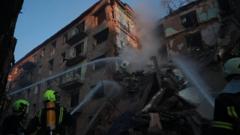Russian President Vladimir Putin met with Iran's foreign minister, reaffirming Russia's backing of Iran amid ongoing military action from Israel and the U.S., while carefully avoiding confrontation with either nation.
Putin Cautiously Navigates Tensions as Iran Faces Military Strikes

Putin Cautiously Navigates Tensions as Iran Faces Military Strikes
In a tense geopolitical landscape, Putin expresses support for Iran without confronting the U.S. or Israel directly.
In a move emblematic of the delicate balance in international diplomacy, President Vladimir V. Putin of Russia held a high-profile meeting with Iran’s foreign minister, Abbas Araghchi, on Monday in Moscow. This meeting comes in the wake of Israel's military operations against Iran, initiated on June 13, which have seen significant air defense capabilities dismantled, nuclear sites targeted, and key military personnel killed.
While Israeli airstrikes have prompted a ferocious response from Iran, including missile attacks directed at Israeli positions, Russia has largely maintained a cautious stance throughout the conflict. However, Putin's public statement to Araghchi marked a notable effort to reaffirm Russia’s allegiance to Iran, without directly antagonizing the United States, which intervened militarily in the fracas the day prior.
Putin labeled Israel’s aggressive actions as “unprovoked aggression against Iran” during his discussions, emphasizing Russia's commitment to supporting the Iranian populace. Allegedly, he also engaged in discussions with various leaders, including President Trump, seeking to position Russia as a mediator in the escalating violence, yet he refrained from condemning either the U.S. or Israel outright.
Kremlin spokesman Dmitri S. Peskov echoed this measured tone, signaling support for Iran while sidestepping any commitment that might ignite tensions with the Trump administration or detract from Russia’s ongoing military efforts in Ukraine. He remained non-committal regarding potential assistance to bolster Iran's air defenses, stating that future support would hinge on Iranian needs.
Through these diplomatic gestures, Russia seems intent on asserting its role in the region while carefully navigating the complex web of alliances and conflicts that characterize the current geopolitical landscape.























